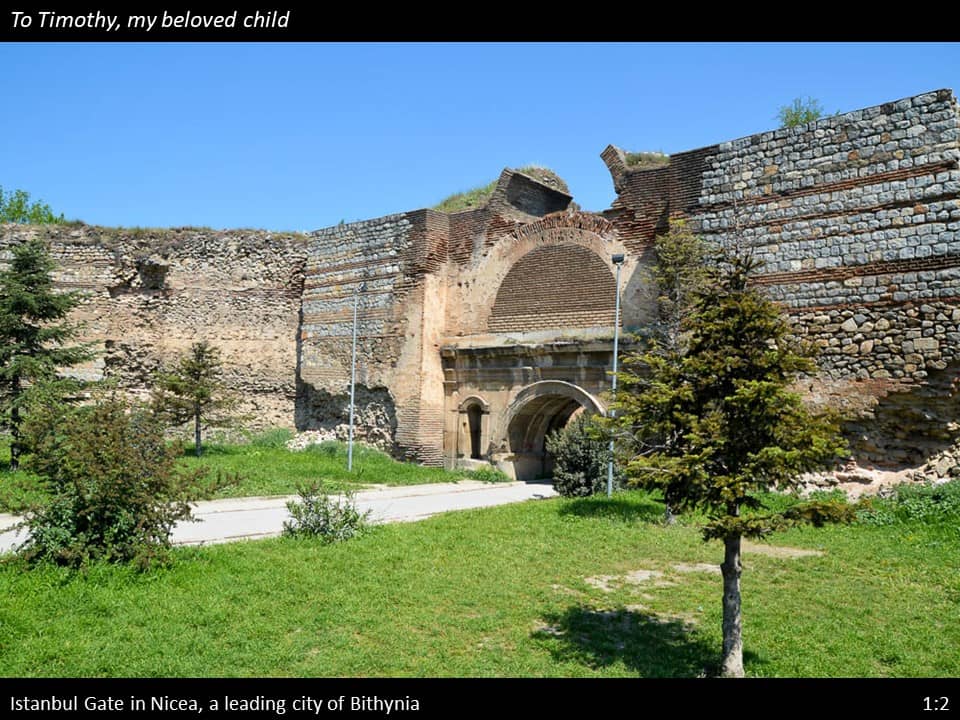There is a short introduction available for the book of 2 Timothy. You can read it here.
Key Themes (2 Timothy)
The book of 2 Timothy, written by the Apostle Paul, is considered his final letter, addressed to his close companion and spiritual son, Timothy. It is a deeply personal and pastoral letter in which Paul encourages Timothy to remain steadfast in the face of trials, to guard the truth of the Gospel, and to continue faithfully in his ministry. The letter reflects Paul’s awareness of his impending death and his concern for the future of the church. The key themes include:
- Perseverance in the Face of Suffering: A central theme in 2 Timothy is the call to endure suffering for the sake of the Gospel. Paul encourages Timothy to be strong and to share in suffering as a good soldier of Christ Jesus. He reminds Timothy that suffering is a part of the Christian journey, especially for those who faithfully preach the Gospel. This theme emphasizes the importance of perseverance and courage in the face of opposition and hardship.
- The Importance of Guarding the Gospel: Paul urges Timothy to hold firmly to the sound teaching he has received and to guard the deposit of faith entrusted to him. He warns against false teachers and the spread of false doctrines, emphasizing the need to protect the purity and integrity of the Gospel message. This theme highlights the critical responsibility of church leaders to safeguard the truth of the Gospel against distortions.
- The Centrality of Scripture: 2 Timothy underscores the importance of Scripture as the foundation for teaching, reproof, correction, and training in righteousness. Paul famously declares that all Scripture is "God-breathed" and useful for equipping believers for every good work. This theme emphasizes the authority, inspiration, and sufficiency of Scripture for guiding the Christian life and ministry.
- Faithful Ministry and Leadership: Paul exhorts Timothy to continue in his ministry with diligence and faithfulness. He encourages Timothy to "preach the word; be prepared in season and out of season; correct, rebuke, and encourage—with great patience and careful instruction." This theme highlights the essential qualities of effective Christian leadership, including dedication, perseverance, and the willingness to teach and guide others with wisdom and compassion.
- The Reality of Apostasy and Opposition: Paul warns Timothy that difficult times will come, and that people will turn away from the truth, pursuing their own desires and listening to teachers who say what they want to hear. He also acknowledges the opposition and betrayal he himself has faced. This theme emphasizes the reality of apostasy, false teachings, and the challenges that faithful believers and leaders will encounter in the last days.
- Paul’s Legacy and the Hope of Eternal Reward: As Paul reflects on his life and ministry, he expresses confidence in having "fought the good fight" and "kept the faith." He looks forward to receiving the "crown of righteousness" from the Lord. This theme reflects Paul’s assurance in the hope of eternal life and the rewards that await those who remain faithful to Christ. It also serves as an encouragement for Timothy to continue his work with the same sense of purpose and hope.
- Mentorship and Discipleship: Throughout the letter, Paul demonstrates the importance of mentorship and discipleship by his relationship with Timothy. He encourages Timothy to entrust the Gospel to faithful men who will be able to teach others, thereby ensuring the continuity of the faith. This theme underscores the importance of passing on the teachings of the faith to future generations and the role of mentoring in spiritual growth and leadership development.
- God’s Faithfulness and Sovereignty: Despite the challenges and sufferings Paul has faced, he expresses confidence in God’s faithfulness and sovereignty. He believes that God will rescue him from every evil attack and bring him safely to His heavenly kingdom. This theme emphasizes God’s unwavering faithfulness to His people and His ultimate control over all circumstances, even in the face of persecution and death.
2 Timothy is a powerful and moving letter that serves as Paul’s final charge to Timothy and the church. Through its themes of perseverance, the importance of guarding the Gospel, the centrality of Scripture, and the hope of eternal reward, Paul provides timeless encouragement and instruction for Christian leaders and believers. The letter calls for steadfastness in faith, dedication to the truth, and the courage to endure hardships for the sake of Christ, all while relying on God’s faithfulness and grace.
What I Noticed Today (2 Timothy 1-4)










In verses 1-2, Paul begins his letter with the usual opening: introducing himself (as an apostle of Christ by God’s will), the intended audience (Timothy), and a greeting (Grace, mercy, and peace from God the Father and Jesus our Lord).
Note: Paul refers to Timothy as his “dearly loved son.” Timothy is not Paul’s biological son but Paul thought of him as a son because of his fatherly relationship and their shared ministry.
In verses 3-7, Paul includes a thanksgiving section in which he says he remembers Timothy in his prayers daily. He longs to see Timothy and be filled with joy as he remembers his faith, that lived first in his grandmother Lois, and in his mother, Eunice. Paul exhorts Timothy to keep the gift of God that came from the laying on of hands. God has not given us a spirit of fear but of power, love, and sound judgment.
Note: In his thanksgiving section, Paul is reminding Timothy of his ministry and how he was commissioned by the laying on of hands. Paul’s reference to “spirit” is the Holy Spirit. Timothy may have been more reserved than Paul, so Paul encourages him to be the powerful leader God intends him to be.
Note: Timothy’s father was a Gentile and likely not a believer. Paul credits Timothy’s faith to the example set by his grandmother and mother, who were both believers.
In verses 8-12, Paul tells Timothy to be courageous and not ashamed of the Gospel:
- Don’t be ashamed of the testimony of our Lord, or of me.
- Instead, share the Gospel, relying on the power of God.
- Because God called us and saved us, not because of our works, but by His grace which was given to Christ before time began. The proof of this is the appearance of Jesus our Savior, who brought life and immortality through the Gospel.
- For this Gospel, I was appointed a herald, an apostle, and a teacher. I am not ashamed because I know the One I have believed in.
In verses 13-18, Paul tells Timothy to be loyal to the faith and guard the truth:
- Hold on to the sound teaching I have given you.
- Guard the Holy Spirit that lives in us.
- All those in Asia have turned away from me, including Phygelus and Hermogenes.
Note: We don’t know anything more about Phygelus or Hermogenes except that Paul singles them out here, and Timothy likely knew what Paul was referring to. Paul does not mean “every Christian” in Asia had turned away from him, but they had not supported him during his time of need (in prison).
- Onesiphorus, however, was a great help to Paul while he was in prison in Rome and had ministered to him in Ephesus.
Note: Paul pointing out Phygelus and Hermogenes as turning away was to contrast them and Onesimus as a comparison between the unfaithful with the faithful.
2 Timothy 2















In verses 1-7, Paul tells Timothy to be prepared to endure hardship:
- Be strong in the grace that is Jesus Christ and what you have heard from me.
- Commit to faithful men who will also be able to teach others.
- Be prepared to share in the suffering for the sake of Christ: 1) like a soldier, stay focused on your mission, 2) like an athlete who competes according to the rules, and 3) like a farmer who is hardworking.
In verses 8-13, Paul uses Christ as an example of endurance:
- Keep your attention on Jesus Christ, who was raised from the dead and descended from David.
- Paul is in prison because of his commitment to preaching the Gospel.
- I (Paul) endure all things for the elect so they might attain salvation. For if we died with Him, we will also live with Him. If we endure with Him, we will also reign with Him. If we deny Him, He will deny us. If we are faithless, He remains faithful.
Note: Paul’s last example, “If we are faithless, He remains faithful,” means even if we lack faith or have a lapse in faith, Christ remains faithful to His promise to us.
In verses 14-26, Paul describes a good Christian worker:
- Paul tells Timothy to remind them (other Christians in Ephesus) of these things, not to fight about words because it is not profitable.
Note: Paul’s language here is an imperative, a command, that Timothy must do this.
- Be diligent and teach the Word of truth correctly.
- Avoid empty, irreverent speech which only increases ungodliness. This spreads like gangrene.
Note: The only treatment for gangrene in Paul’s day was to amputate the affected area because otherwise, it would spread throughout the body.
- Hymenaeus and Philetus had become ungodly, having wandered away from the truth. They said the resurrection had already taken place, causing some to turn away from the faith.
- God’s foundation is firm; the Lord knows those who are His. Everyone who calls on the name of the Lord must turn away from unrighteousness.
- Paul uses a second metaphor of different types of bowls for the contamination of the believer (from faithful too unfaithful). Some bowls are for honorable use, others are not. If a person is purified from the dishonorable, he will be set apart, useful to the Master for every good work.
Note: Paul’s point to Timothy is that he must avoid the false teachers who are dishonorable and then he would be 1) honorable, used for noble purposes, 2) set apart, 3) useful for service, and 4) prepared for every good work.
- Flee from youthful desires and pursue righteousness, faith, love, love, along with those who call on God with a pure heart.
- Reject the foolish and ignorant disputes that breed quarrels.
- The Lord’s slave must be gentle to everyone, able to teach, patient, and instructing others with gentleness. Perhaps then God will grant them repentance and knowledge of the truth, and they will escape the Devil’s trap.
Note: Paul is connecting false teaching with a trap of the Devil that leads people away from the truth of Christ.
2 Timothy 3








In verses 1-9, Paul details the degradation of society that will occur in the last days (in this case the last days refers to the entire time between Paul’s writing and the return of Christ). Paul describes the people and tells Timothy to avoid people who are:
- Lovers of themselves (self-centered),
- Lovers of money,
- Boastful,
- Proud,
- Blasphemers,
- Disobedient to parents,
- Ungrateful,
- Unholy,
- Irreconcilable,
- Slanderers,
- Without self-control,
- Brutal,
- Without love for what is good,
- Traitors,
- Reckless,
- Conceited,
- Lovers of pleasure rather than God,
- Having a form of Godliness, but denying its power.
In verses 6-9, Paul’s focus shifts to specific situations in Ephesus:
- Among them (the people like those listed above) are people who worm their way into people’s homes and lead astray the weak. In their open-mindedness, they fall prey to all kinds of new thinking but failed to acknowledge the truth of God.
- Paul gives an example of Jannes and Jambres, who resisted Moses, so they also resist the truth. They are corrupt, worthless in regard to the faith, and eventually, they will be seen by everyone for what they are.
Note: Paul’s reference to Jannes and Jambres relates to a Jewish legend that these two men were magicians in Pharaoh’s court who were unable to compete with the signs of Moses (Exodus 7:11, 9:11).
In verses 10-17, Paul warns Timothy of the struggles he will face in the Christian life:
- You have followed my teaching, conduct, purpose, faith, patience, love, and endurance along with persecutions in Antioch, Iconium, and Lystra.
- The Lord rescued me from them all.
- All those who wish to live a Godly life in Christ will be persecuted.
- Evil people will be worse; deceiving and being deceived.
- But you (Timothy) should continue in what you have learned and believed.
- The Scripture will give you wisdom for salvation through faith in Jesus Christ.
- All scripture is inspired by God, profitable for preaching and teaching, for rebuking and correcting, and for training in righteousness so that the man of God may be complete, equipped for every good work.
2 Timothy 4
















In verses 1-8, Paul commands Timothy in the strongest way possible.
Note: This is Paul’s strongest charge of responsibility to Timothy. Paul says, “I solemnly charge you.” Then charges him in the name of God and Christ Jesus who is the judge of the living dead and because of His appearance and kingdom (Christ’s return and millennial reign).
- Proclaim the message, whether it is convenient or not.
- Rebuke, correct, and encourage with patience and teaching. Because the time will come when they will reject sound doctrine because they want to hear something new.
- But you (Timothy) should be serious about everything, endure hardship, do the work of an evangelist, and fulfill your ministry.
- Referring to his own death, Paul said he was being poured out as an offering (a reference to the Old Testament sacrificial offerings). He knew his death was near. He had fought the good fight, finished the race, and kept the faith. He was looking forward to receiving his reward, a crown of righteousness, which the Lord will give him on judgment day when Christ returns.
In verses 9-16, Paul issues his final instructions to Timothy:
- Make every effort to come to me soon. Demas, Crescens, and Titus have gone. Only Luke is still with him.
- Bring Mark because he is useful to me in the ministry.
Note: Paul had previously rejected Mark (Acts 15:36-40) but now the older, more experienced Mark will be useful in the ministry to Paul.
- I have sent Tychicus to Ephesus.
- Bring the cloak from Troas as well as the scrolls and parchments.
- Alexander the coppersmith did great harm to me. The Lord will repay him. Watch out for him because he strongly opposes us.
- Paul asked that it not be held against those who deserted him at his first defense.
Note: Timothy would have already known about Paul’s first imprisonment, so this reference to men deserting him is more likely to a preliminary hearing leading up to his next trial. Paul’s words (may it not be counted against them) were the same words Jesus used on the cross (Luke 23:34).
- But the Lord stood with me so that the proclamation (of the Gospel) was made fully so the Gentiles might hear.
- I was rescued from the lion’s mouth and the Lord will rescue me from every evil work and bring me to His Heavenly Kingdom. To Him be the Glory.
Note: Paul knew his fate. He viewed it not as a sentence of death but as being rescued into the safety of heaven.
In verses 19-22, Paul issues his final greetings and benediction.
- Greet Priscilla and Aquila, and the house of Onesiphorus. Erastus is in Corinth. Trophimus is sick in Miletus.
- Make every effort to come before winter.
- Eubulus, Pudens, Linus, Claudia, and all the brothers greet you.
- Paul’s closing benediction: The Lord be with your spirit. Grace be with you.
Note: In verse 22, “your spirit” is singular meaning Timothy, “you” is plural meaning all the brothers.
Some additional thoughts for consideration:
- Paul’s freedom had not lasted long and now he faced another trial which he believed would lead to his death. He had been abandoned by almost all of those who supported him in prison. Yet he still reached out to young Timothy to encourage and instruct him as his “son” in the ministry.
- God’s grace will strengthen us and equip us for whatever work He has called us to complete for the Kingdom.
- Whatever persecutions come our way, we must be faithful to complete the work God has assigned us.
What did you notice in your study today? Feel free to visit the website and leave a question or a comment.

